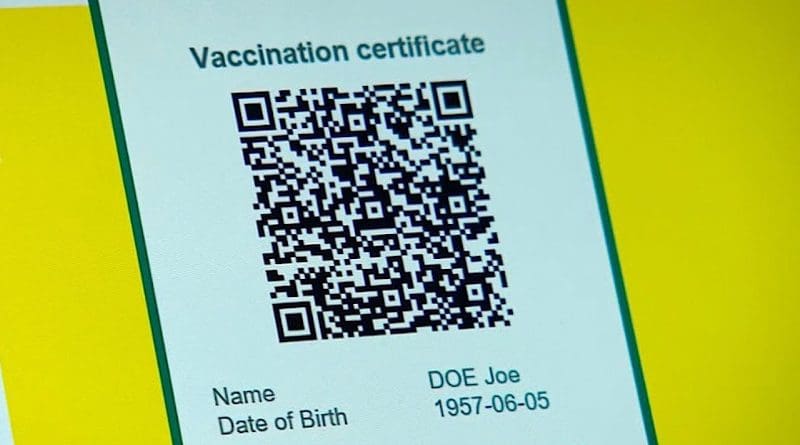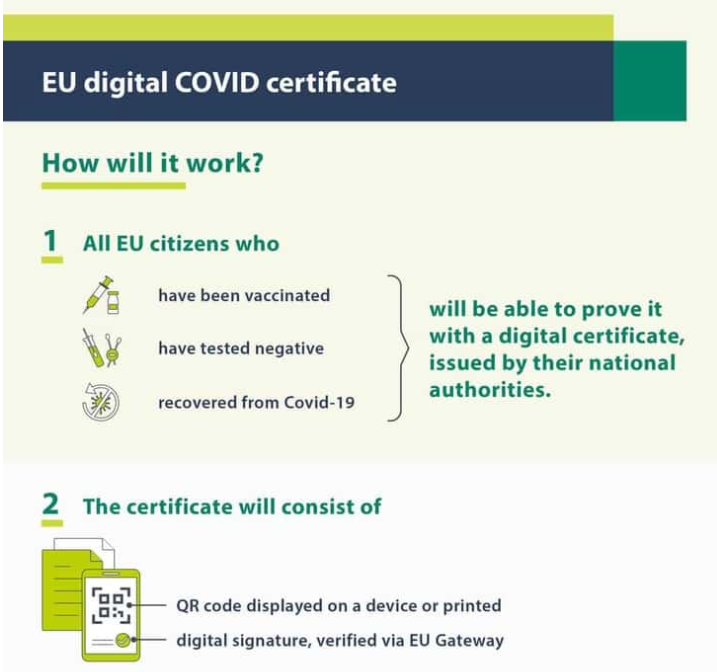Digital Green Pass: EU’s Ticket To Freedom Of Movement? – OpEd
By Michael Severance*
On June 8, the European Travel Information and Authorization System (ETIAS) announced the EU’s health certifications, effectively a “Covid passport” for traveling between member states. ETIAS confirmed an electronic application and control system will be fully rolled out by July 1, 2021 much like what is already functioning in Israel. This comes after initial diagnostic systems tests were conducted in several EU countries for what is now officially called the “Digital Green Pass.”
During the pandemic, international and even inter-regional travel within the European Union has been tightly restricted to “essential movement only.” Hence, traveling for pleasure in Europe’s beautiful capitals, bucolic countryside, and majestic coastlines did not occur regularly until now, except during the summer of 2020 when holidaymakers were mostly confined to visiting their home nation’s territories.
The Digital Green Pass is a purposively attractive name because the goal is to make it widely and immediately used. It is easily downloadable, ecologically sensitive (making paper certifications optional), and most of all it is appealing because it implies a sure “bridge to freedom” after 15 months of various degrees of lockdowns, curfews and obligatory smart-working.
Part of the reason the pass is green is that it grants travelers the “green light” to visit other countries. However, strategically, it appears to encourage a paperless digital bureaucracy. The electronic certificate will be produced via an app issuing unique QR codes and electronic signatures for individuals, hospital administrations, and a centralized internet “gateway” to verify compliance at border control stations. Under the heading, “How does the EU certificate work”, we read:
All certificates have a unique QR code. When the certificate is checked, the QR code and traveler’s signature will be verified. Each issuing body, like a hospital, has a digital signature key which is stored in a secure database in each country. The European Commission built a gateway that will verify all certificate signatures across the EU.
Humans may continue to fall because of Covid-19, but apparently far fewer trees! The app uploads certifications for those who either have received either a vaccine (acceptable are only Pfizer, Moderna, AstraZeneca, Janssen), passed a molecular viral test, or obtained a certified hospital recovery form guaranteeing natural immunity. So with any of these three green lights, regular human traffic resumes on planes, trains, boats and automobiles throughout the Old Continent. Just think about it: pandemic travel to the Eiffel Tower, to the Roman Colosseum, the High Castles of Bavaria. Sounds like a long-awaited dream, right? Well…right and wrong. Part of the problem has to do with privacy protection, even if we are promised: “personal data… is not passed on to the gateway.”
In the June 8 announcement, we now know the Digital Green Pass roll-out will be universally “fast-tracked”, just like the vaccines have been, and remain in effect for 12 months:
Following a European Parliament vote… and the provisional agreement signed by the European Council on May 20 to fast-track its implementation, the EU Digital COVID Certificate will be operational by the 1st of July 2021. [It will]… allow EU citizens to move safely within the European Union during the COVID-19 pandemic. However, it should not be considered as a travel document nor a precondition to exercise the right to free movement.
We are right to surmise that another part of the problem is that ETIAS itself states that the Digital Green Pass is not “a pre-condition to exercise the right to free movement.” What do they mean by that? Let’s use is a little “big-state imagination.”
Undoubtely, we can envisage Brussels or individual member states mandating further restrictions and/or documented verification as “proof of the proof” that a traveler is really in fact a virus-free passenger, driver, or even walker across EU borders. Bureaucracy has a tendency to breed unto itself.
Moreover, there will surely be pirated and hacked versions of ETIAS’ mobile application. This will cast large shadows of doubt on the QR and hospital key code authenticity. So border agents will require signed affidavits, originally printed with inked signatures of physicians and even multiple digital certificates for the many strains of the virus that will likely rear their ugly spiked heads in the near future. Then, there will be demands for standardization of national identification cards so as to avoid any and every false I.D.s “photoshopped” or issued by corrupted officials. Subsidiary microdecisions of compliance by member states will, thus, bow to the sweeping and hasty directives of Brussels health and travel commissions.
Yet, ETIAS seems to assure Europeans that bureaucratic hiccups will be few, or certainly less than we imagine, because “[as of] May 10, 2021, 22 nations have successfully tested the system.”
Lastly, one unintended (or perhaps very much intended) consequence of the “free” app: installed software on cell phones ultimately provides traceable digital footprints regarding one’s location, specifically if the cell phone is connected to the internet and the application accessed. I suppose this is part of the plan, that is, to create a surveillance system just in case travelers fall mysteriously ill to the disease, which is presumably already happening in many persons post-vaccination. Do Europeans really want to be tethered to a digital big brother, even if he appears to be a friendly green giant? Why not make the digital certificate a Brown Pass, going fully analog on paper and, thereby, guaranteeing off-grid privacy and freedom from digital tracing?
One thing we all agree on is that travel is big business and the tourism trade is no small percentage of European GDP. According to ETIAS, “Tourism in Europe [has regularly] provided 27 million jobs and generated 10% of the EU’s GDP.” Without immediately resuming travel, for business and pleasure, the hardest hit service providers (hotels, restaurants, souvenir shops, rental cars, airlines, ferries, etc.) will soon find themselves beyond financial repair. They will either be nationalized, propped up by massive emergency bailouts (again!) and thus be the cause célèbre for soaring EU tax burdens and inflation for all. At the very least, we might expect these businesses to be subject to foreign takeovers, leading to a dramatic drop in native entrepreneurship and corporate investment within EU borders. If Europe is to remain European, this must be avoided with a clear plan on supporting local ownership and with as little red tape as possible placed on continental travel moving forward.
*About the author: Michael Severance is an author at the Acton Institute.
Source: This article was published by the Acton Institute



Digital Freedom Pass
The rise of powerful digital monopolies linked to the rise of inequalities in major market economies, large-scale manipulation of digital users for political purposes, and the widespread inability of digital users to grasp the business purposes that their data serves threatens to undermine market economies and democratic processes. The DFP would spearhead a reversal of these
alarming trends, since it would give us property rights over our most important possession – information about ourselves – and thereby would give us our most valued freedom in the economic realm: the freedom to choose.